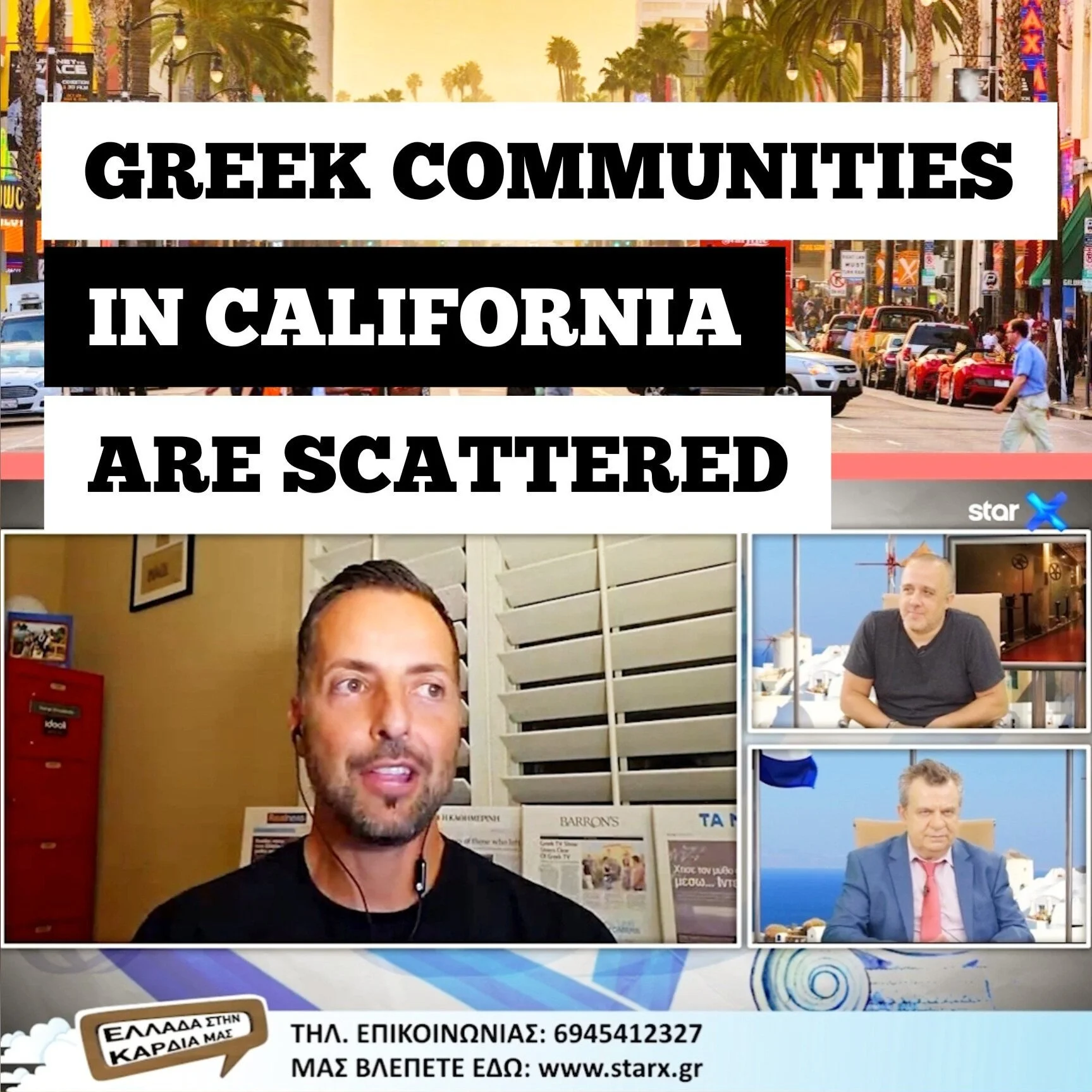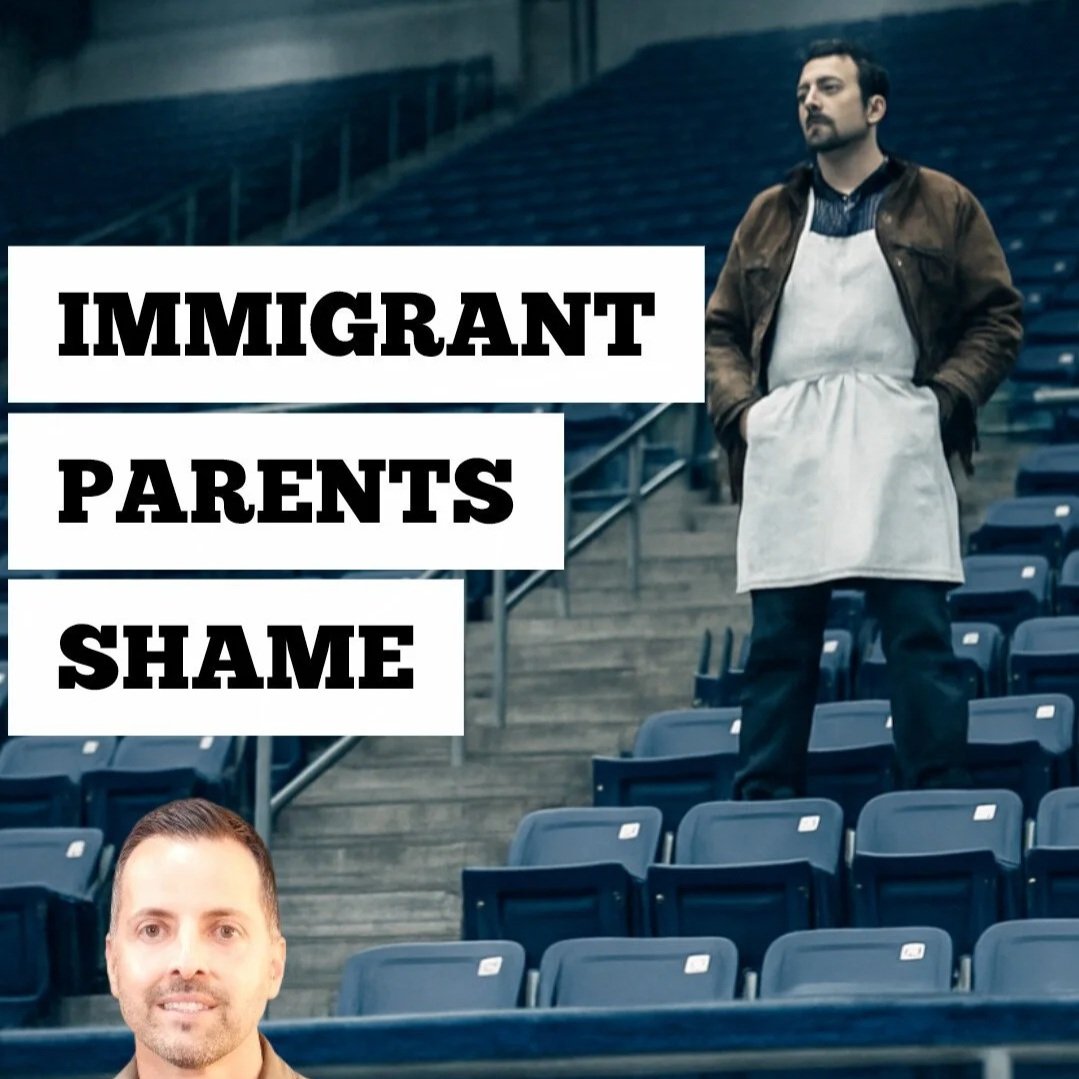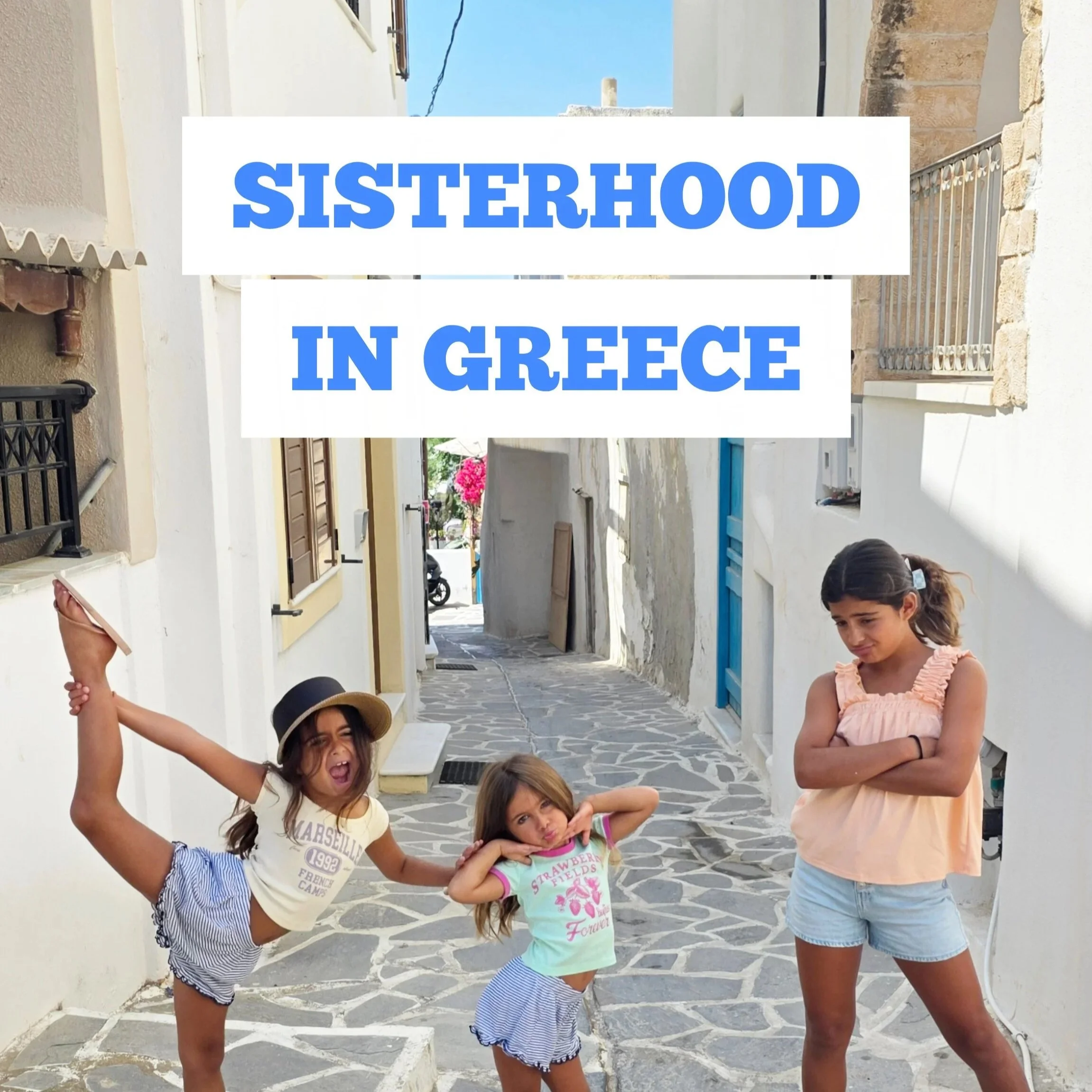NO CORE AREA FOR THE GREEKS IN LOS ANGELES - BUT WHY?
“Here in California it is different. Everything is far. There is no central street to say that is our hub for Greeks like in other major cities like Toronto, New York, Boston and Melbourne. ”
SO MANY GREEKS IN CALIFORNIA BUT YET THERE IS NO DISTRICT OR STREET DEDICATED TO THEM
No Core Area for Greeks in California! Do you agree? There are a lot of Greeks in Los Angeles. Several. But the big thing is I grew up knowing Toronto's Greek town, the Danforth. All the Greeks there.
Then I lived 15 years in New York City. The biggest Greek Hub in America. Here in California it is different. Everything is far. There is no central street to say that is our hub. I've discussed this with Tony as well. When Greece wins its next Euro Cup, I have no idea where we would celebrate here in California.
There is no single road dedicated to Greeks. That is what I am still trying to find... or to build!
Οι Έλληνες στην Καλιφόρνια είναι γεωγραφικά διάσπαρτοι. Συμφωνείς?
Υπάρχουν πολλοί Έλληνες στο Λος Άντζελες. Αρκετά. Αλλά το σημαντικό είναι ότι μεγάλωσα γνωρίζοντας την ελληνική πόλη του Τορόντο, το Danforth. Όλοι οι Έλληνες εκεί.
Μετά έζησα 15 χρόνια στη Νέα Υόρκη. Το μεγαλύτερο ελληνικό Hub στην Αμερική. Εδώ στην Καλιφόρνια είναι διαφορετικά. Όλα είναι μακριά. Δεν υπάρχει κεντρικός δρόμος για να πούμε ότι είναι ο κόμβος μας. Το έχω συζητήσει και με τον Τόνι. Όταν η Ελλάδα κατακτήσει το επόμενο Euro Cup, δεν έχω ιδέα πού θα γιορτάζαμε εδώ στην Καλιφόρνια.
Δεν υπάρχει ούτε ένας δρόμος αφιερωμένος στους Έλληνες. Αυτό προσπαθώ ακόμα να βρω... ή να χτίσω!
WHAT ARE THE MOST POPULAR GREEK HUBS OUTSIDE OF GREECE?
The Greek diaspora has established significant communities around the world. Some of the most popular Greek hubs outside of Greece include:
Melbourne, Australia: Melbourne has one of the largest Greek populations outside of Greece, with a strong Greek presence, numerous Greek restaurants, and cultural events.
New York City, USA: Astoria in Queens is known for its substantial Greek population, and there are many Greek businesses, restaurants, and cultural organizations throughout the city.
Toronto, Canada: The Danforth neighborhood in Toronto, often referred to as "The Greek Town," is a prominent Greek hub with a rich Greek cultural scene.
London, United Kingdom: London has a significant Greek community, with areas like Palmers Green and Wood Green known for their Greek presence, offering various Greek shops and restaurants.
Sydney, Australia: Sydney has a thriving Greek community with a Greek festival, Greek Orthodox churches, and cultural activities.
Chicago, USA: The Greektown neighborhood in Chicago is home to a variety of Greek businesses and restaurants, contributing to the city's diverse cultural landscape.
Montreal, Canada: Montreal has a well-established Hellenic community with Greek neighborhoods, cultural organizations, and events.
Johannesburg, South Africa: The Greek community in Johannesburg is one of the oldest in the country and maintains a strong cultural presence.
Buenos Aires, Argentina: Buenos Aires has a significant Greek community, with Greek restaurants, Orthodox churches, and cultural events.
Athens, Greece: While not outside of Greece, Athens itself is a significant hub for the Greek diaspora, with many expatriates and international students from other countries.
These are just a few of the notable Greek hubs outside of Greece, where Greek communities have flourished and continued to preserve their cultural heritage and traditions.
WHAT IS THE HISTORY OF GREEKS IN LOS ANGELES?
The history of Greeks in Los Angeles, like many Greek diaspora communities, is marked by a story of immigration, settlement, cultural preservation, and community development. Greeks began arriving in Los Angeles in the late 19th and early 20th centuries. Here is an overview of their history in the city:
Early Immigration: The first wave of Greek immigrants to Los Angeles occurred in the late 19th and early 20th centuries, primarily from regions in Greece such as Crete, Anatolia, and the Peloponnese. These early immigrants often came seeking economic opportunities and escape from political instability in their home country.
Greek Town: By the early 20th century, Greek immigrants in Los Angeles began to settle in areas like Downtown Los Angeles and the historic Greek Town, which was centered around 8th Street and Hoover Street. Greek Town became a cultural and social hub for the community, with Greek businesses, restaurants, and Orthodox churches.
St. Sophia Greek Orthodox Cathedral: St. Sophia Greek Orthodox Cathedral, located in the Pico-Union neighborhood, is one of the most significant institutions for the Greek community in Los Angeles. It was established in 1952 and continues to serve as a center for religious, cultural, and community activities.
Cultural Preservation: Greeks in Los Angeles worked to preserve their cultural heritage, organizing events, festivals, and language schools to teach Greek language and traditions to the younger generation.
Expansion and Integration: Over the years, the Greek community in Los Angeles expanded beyond Greek Town, with many Greek-owned businesses and restaurants found throughout the greater Los Angeles area. Greek-Americans also integrated into the broader society while maintaining their cultural identity.
Greek Festivals: The annual Los Angeles Greek Festival, held at St. Sophia Cathedral, has become a prominent cultural event in the city, showcasing Greek food, music, dance, and traditions to a diverse audience.
Second and Third Generations: As the Greek community in Los Angeles grew, second and third-generation Greek-Americans continued to participate in preserving their cultural heritage, often through participation in organizations and community activities.
Today, the Greek community in Los Angeles remains vibrant and continues to celebrate its heritage through cultural events, religious activities, and community organizations. The city is home to a diverse and well-integrated Greek-American population that has made significant contributions to the cultural and economic life of the region.
WHAT IS THE GREEK DIASPORA?
The Greek diaspora refers to the worldwide dispersion of people of Greek descent who have settled in countries outside of Greece. This diaspora has been ongoing for centuries, starting with ancient Greek colonies and expanding significantly during periods of economic hardship, political upheaval, and conflict in Greece. The Greek diaspora is one of the oldest and most widespread in the world, with Greek communities in numerous countries. Here are some key points about the Greek diaspora:
Historical Background: The Greek diaspora can be traced back to ancient times when Greeks established colonies across the Mediterranean and Black Sea regions. In modern history, major waves of Greek migration occurred during the 19th and 20th centuries due to factors such as poverty, political instability, and conflicts, including the Greek War of Independence (1821-1829) and the Asia Minor Catastrophe (1922).
Key Destinations: Greeks have settled in various countries, with significant communities in the United States, Australia, Canada, Germany, the United Kingdom, South Africa, and other countries. These communities often retain strong connections to their Greek cultural and religious heritage.
Cultural Preservation: The Greek diaspora has played a crucial role in preserving Greek culture, language, and traditions outside of Greece. Greek communities worldwide celebrate Greek Orthodox religious traditions and host cultural events, festivals, and language schools to pass down their heritage to the younger generations.
Economic Contributions: Greek diaspora communities have made significant economic contributions to their host countries and to Greece through remittances and investments. They have also been involved in various professions and industries, including food, hospitality, shipping, and academia.
Greek Orthodox Church: The Greek Orthodox Church plays a central role in the lives of many Greek diaspora communities, serving as a spiritual and cultural anchor.
Civic Engagement: Greeks in the diaspora often engage in political and civic activities related to Greece, advocating for issues concerning their homeland and maintaining close ties to Greek politics and culture.
Political Influence: Greek diaspora communities have at times exerted political influence in their host countries, and they have been involved in efforts to support Greece during moments of crisis.
The Greek diaspora has had a profound impact on the preservation and dissemination of Greek culture and identity around the world. It continues to be a dynamic and influential force in the global Greek community.





















